Promote your heart health by eating more of THESE vegetables
 (NaturalHealth365) When it comes to vegetables, springtime is best described as a rhapsody in green. Asparagus, pea pods, freshly foraged ramps, sorrel, toddler carrots, yardsticks of rhubarb … Farmers’ markets and market stalls overflow with mineral crunch, reminding customers long full of winter’s starch and iron that it’s time to gorge on the green. “Eat your vegetables” is common advice parents give their children, but it appears that while all vegetables are created edible, not all are created equal when it comes to nitrate-richness and promoting heart health.
(NaturalHealth365) When it comes to vegetables, springtime is best described as a rhapsody in green. Asparagus, pea pods, freshly foraged ramps, sorrel, toddler carrots, yardsticks of rhubarb … Farmers’ markets and market stalls overflow with mineral crunch, reminding customers long full of winter’s starch and iron that it’s time to gorge on the green. “Eat your vegetables” is common advice parents give their children, but it appears that while all vegetables are created edible, not all are created equal when it comes to nitrate-richness and promoting heart health.
According to research conducted at New Edith Cowan University (ECU), just one cup of nitrate-rich vegetables each day can lower blood pressure and significantly reduce the risk of heart disease. The study, which took place in Denmark, analyzed the dietary habits and health of more than 50,000 people over a 23-year period.
Make space on your plate for THESE veggies to improve your heart health
So what vegetables are rich in nitrates? Leafy greens such as spinach, lettuce, arugula, and Chinese cabbage are high in nitrates, and non-leafy vegetables like radishes, celery, beet, carrots, and fennel also have a strong nitrate content.
While a cup of “raw” vegetables is recommended to encourage heart health, researchers estimate that cooking vegetables reduces the nitrate content by 50%, which is still enough to promote a wide range of cardiovascular benefits.
According to lead researcher, Dr. Catherine Bondonno, “the greatest reduction in risk was for peripheral artery disease (26 percent), a type of heart disease characterized by the narrowing of blood vessels of the legs. However, we also found people had a lower risk of heart attacks, strokes, and heart failure.”
Don’t be fooled: The difference between all-natural nitrates and added nitrates is night and day
Nitrate is a confusing word. Chances are you’ve been warned to steer clear of nitrates in food, but that’s a blanket statement that needs deconstruction.
Yes, synthetic nitrates such as potassium nitrate may cause health problems. These are the chemicals added as preservatives to processed foods like deli meat, cured meat, bacon, sausage, and hot dogs. According to the Environmental Working Group, when you consume synthetic nitrates or nitrites, your body breaks them down into a compound called nitrosamines, which have been linked to an increased risk of cancer.
Vegetables and fruit, on the other hand, acquire nitrates and nitrites from the soil they grow in. Nitrates are part of natural mineral deposits, while nitrites are formed by soil microorganisms that break down animal matter. Vegetables and fruits are protein-rich and contain protective components like vitamin C, polyphenols, and fiber, which have all been shown to reduce nitrosamine formation.
Load up on nitrate-rich vegetables to protect your heart
Globally, a staggering 17.9 million people die of heart disease each year. In the U.S., where heart disease is the leading cause of death for men, women, and most racial and ethnic groups, 655,000 people die per year.
The numbers tell us one thing:
It’s time to embrace the greens. If you want to promote heart health, eat a widely varied diet with plenty of nitrate-rich vegetables and avoid excessive amounts of processed meat.
Sources for this article include:



